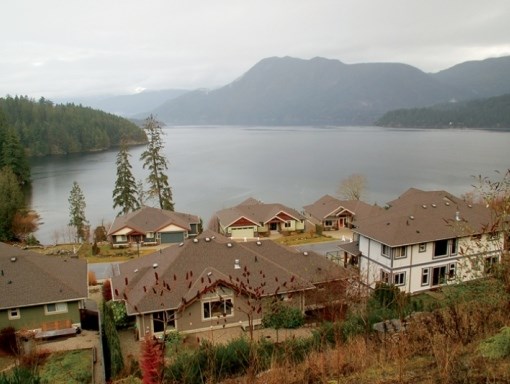Lawyers for eight Seawatch homeowners involved in lawsuits against the District of Sechelt, developer Concordia Seawatch and others were in court last week to challenge the covenant on the properties that was at the centre of a public dispute between the parties back in April.
In a “Fact Sheet” issued by the district shortly after the February 2019 evacuation of Seawatch, the district said: “This covenant attached an expert geotechnical opinion that described the geotechnical attributes of the land and documented the history of sinkholes in the area to that time. [It] was registered on the title of each lot in the subdivision. All subsequent purchasers had notice of the known underlying geotechnical hazards in the subdivision.”
The district has not been commenting on the lawsuits outside of its court filings, but on April 9 it sent out a press release saying it was putting the property owners and Concordia Seawatch “on notice” about what it claimed was a contractual obligation tied to the covenant to “take responsibility for the repair and stabilization of failing road infrastructure, slopes and similar features.”
Lawyer Jeff Scouten, who represents the eight property owners now challenging the covenant, said at the time that the covenant doesn’t contain any sort of collective obligation to repair the roads and hillside.
“In its recent demand, the District seeks to take the covenant a step further and maintains that it creates a positive obligation on the part of the homeowners to spend millions of dollars – which the District claims it cannot afford – to fix the subdivision themselves,” said Scouten in an April 20 press release. “If this is the hill the District has chosen to wage its battle with the owners on, it is pretty shaky and unstable ground.”
Scouten set out how he planned to test that ground on his clients’ behalf in two applications filed with BC Supreme Court in Vancouver on June 23 and 25.
In the June 23 application, the property owners ask the court to “cancel” the covenant, referred to in the court papers as the “Section 219 Covenant (Geotechnical).”
The June 25 application, filed in the name of one of the property owners, asks for a ruling on the district’s reliance on the covenant as part of its defence and argues that the court should find “the plaintiffs have not, by reason of the existence of Section 219 Covenant … released the District of Sechelt from the entirety, or from any, of the claims alleged or damages sought in this action.”
One of the main arguments presented in the property owners’ application to have the covenant cancelled is that the geotechnical report it included is “obsolete” because it has since “been completely overtaken and replaced by the many extensive and detailed investigations and assessments of the geotechnical conditions and risks.”
The application also argues that other sections of the covenant, including the one the district said shows the property owners and developers are responsible for “the repair and stabilization of failing road infrastructure, slopes and similar features,” are too vague and “fall far short of the standard of clarity and precision recognized by the courts as essential to their enforceability.”
In the June 25 application, the property owners argue that the district’s amended response to the lawsuit includes a “new and different defence” that the covenant released the district from “any potential future claim arising out of or connected in any way to the geotechnical conditions” and that the legislation governing covenants does not “authorize the inclusion of a release of liability given by the covenantor to the municipality.”
In a section setting out why the plaintiffs believe the court should rule on whether the convenant “affords a defence to all, or any, of the claims,” the property owners say, “If the issue is decided in the district’s favour, it will significantly narrow the issues involved in the case by eliminating the District altogether as a defendant.”
They also argue that if the court finds in their favour, “it will make clear before the trial that the defence raised by the District will not avail to negate the District’s liability if some or all of the claims made against it are otherwise ultimately established at trial.”
“Knowing ahead of trial that this ‘trump card’ excusing the district from liability for acts or omissions for which it would otherwise be liable does not exist will enhance the prospects of settlement before trial,” the property owners argue.
After five days of hearings during the week of July 20, the judge hearing the application chose to reserve judgment.



